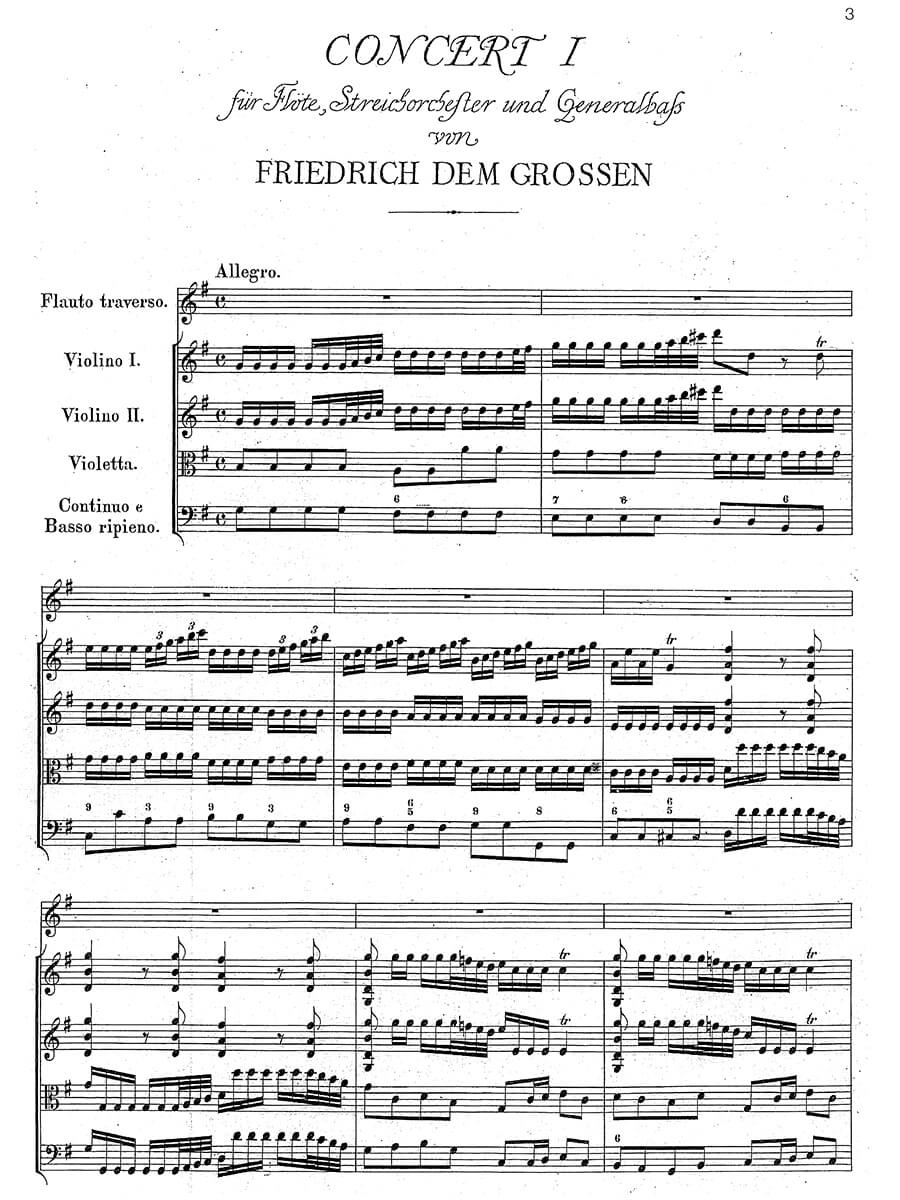Vier Flötenkonzerte, Nr. 1 – 4
Friedrich der Grosse (Friedrich II. von Preußen)
28,00 €
Preface
Friedrich der Grosse (Frederick II of Prussia “the Great”) – Four Flute Concertos
(b. Berlin, 24 January 1712 – d. Potsdam 17 August 1786)
Flute concerto no. 1 in G major
1. Allegro
2. Cantabile
3. Allegro assai
Flute concerto no. 2 in G major
1. Allegro
2. Grave e cantabile
3. Allegro assai
Flute concerto no. 3 in C major
1. Allegro
2. Grave
3. Allegro assai
Flute concerto no. 4 in D major
1. Allegro
2. Adagio
3. Allegro
Preface
“Arts and sciences join hands. We thank them for everything. They are the benefactors of the human race. The citizen of great cities enjoys them without knowing in his proud comfort how many waking nights and efforts it takes to satisfy his needs and satisfy his often whimsical inclinations. “1
These are words of profound understanding and far-reaching reflection with which Frederick the Great describes the often laborious process of creating works of art. When Frederick wrote these lines in his 1772 treatise Über den Nutzen der Künste und Wissenschaften im Staate (On the Usefulness of the Arts and Sciences in the State), he had already been King of Prussia for more than three decades. Even during his reign, Frederick devoted himself to his many-sided artistic and philosophical inclinations, was in contact with the great personalities of the intellectual history of his time – one only has to think of his intensive, witty correspondence with the French philosopher Voltaire – and was active as a writer, composer and philosopher. As the latter, he even professed himself in his will, in which he decreed as one of his last wishes a simple burial without great ceremonies: “I have lived as a philosopher and want to be buried as such, without ostentation, without solemn pomp. “2
The efforts mentioned by Frederick in the introductory quotation, which are necessary to create art, are not only based on theoretical considerations, but he could also draw on his own experience as a composer and flutist. Trained, among others, by the famous flutist Johann Joachim Quantz, his instrumental skills, according to tradition, reached a professional level.3 As a composer, Frederick left behind a thoroughly respectable oeuvre, although it is devoted primarily to his instrument, the flute.
He was well aware that art had to take a back seat to his new duties as king – in this capacity Frederick saw himself as the first servant of the state. Thus, shortly after ascending the Prussian throne, he wrote to Voltaire: “In the future, my people, whom I love warmly, / will be the only god to whom my work is dedicated. / Farewell, you verses and you melodies, / Farewell, enjoyment, even Voltaire, farewell! / The highest goddess is duty henceforth. …
Read full preface / Das ganze Vorwort lesen> HERE
Score Data
| Edition | Repertoire Explorer |
|---|---|
| Genre | Solo Instrument(s) & Orchestra |
| Printing | Reprint |
| Pages | 99 |
